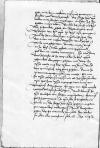Ich hab negst zwen ⌊⌋ von euch empfanngen, den ⌊⌋ mit schrifftenn an ⌊kayserliche mayestet⌋, / unnd nach innhalt derselben wol verstanden. / Ist mir hertzlich leid gewest, / das ir zu solchem argkwan kumen, / unnd das ich euch hie bei vil dingen nicht mocht haben. / Ich halts darfur, / das ir nun von anndern bericht, / wie die belehenung des ⌊von Kronenberg⌋ / gescheen / uber alle zusage mir gethan. / Bin derhalbenn gerufft zu ⌊koniglicher mayestet von Hungern unnd Beheim⌋, / unnd unndter anndernn vil mit irer mayestet disen tag geredt, / angetzaigt, / das ubel vergessenn hab der ⌊von Kronenberg⌋, / das er nit auch, / so er ⌊Ithalien⌋, ⌊Deutschland⌋ unnd ⌊Preussen⌋ benennt, / das konigreich ⌊Beheim⌋ zulehen gebeten, / so im jar 1397 ⌊Wenceslaus⌋, inn Beheim unnd romischer konig, / alle ordensbruder / aus Behemen vertriben unnd alle guter eingenomen, / wer unnser disputacion derhalben lanng zuertzelen etc. Hab darnach Euer gedacht, / ⌊ir mayestet⌋ gebeten / mich wolt lassenn wissen, / warumb ir so verdechtlich irer mayestet seyt angeben, / so ir doch hie nicht annders habt zuthun gehabt, / dann Euers ⌊herrn⌋ sachen zuverantworten / gegen seiner furstlichen gnaden misgonnern. / Hat mir ⌊ir mayestet⌋ geantwort, / das sie nichts wider euch habe, / auch kein argkwan auf euch gewonnen etc. sonnder wol darpey gewest, / das solchs ⌊kayserlicher mayestet⌋ wider euch solt sein angetragen, / mit der ich derhalben mocht reden. / Unnd so ich sunst mit ⌊kayserlicher mayestet⌋ zuhanndeln gehabt, / bin ich gleich heut umb vesperzeit von ⌊koniglicher mayestet⌋ zu kayserlicher mayestet ganngen, / unnd da ich anndere sachen angebracht, / hab ich der Euern nit mogen vergessen unnd gesagt, / wie ir mir geschrieben, / daneben ainen brief an ir kayselriche mayestet gestelt, / mir zugesanndt. / Hab den nit wollen antworten, / es wer dann, das ich weste, ob ir was wider ir ⌊kayserliche mayestet⌋ gehanndelt oder gethan, / gebeten mit vleis, / ir mayestet wollt mich das lassenn wissenn, / unnd wer es muglich euch glait zugeben, / damit ir zu veranntworttung kumen mocht. / Hat mir ir mayestet gesagt, / sie wisse nit ob Irs seyt, / sonnder man hab irer mayestet angetzaigt, / wie ainer von marggraf ⌊Albrechtenn⌋ hie wer, / ain boser mensch, welcher vil boser stuck gethan, / unnd dorauf ir mayestet bevolhen ain solchen antzuhalten. / Hierauf hab ich geantwort, / ⌊ir mayestet⌋ solt soleichtlich nit glaube in, / die solchs irer mayestet hettenn angetragen / weren das widerthail / unnd derhalben gethan, / das hie niemands sein soldt, / der wider sie reden oder protestirn solt / etc. Sagt auch ir ⌊mayestet⌋, wie inn meins herrn des ⌊konigs⌋ gerechtickait mit der belehenung dem ⌊von Kronenberg⌋ gescheen gegriffen wer, / des weitleufftig ir mayestet erinnert, / das ich inn dieser eyl nit mag erholen / etc. / Hierauf sagt mir ⌊ir mayestet⌋, / ich soldt ir Euern unnd ander hendel stellen inn schrifftenn inn ain memorial, / unnd morgen irer mayestet zuhanden schicken. / Woldt die reth darubersetzen unnd alles thun, was ⌊im⌋ muglich. / So wil ich Euer sachen, / sovil ich werd mugen, im besten gedencken, / unnd was sich weitter wirdt zutragen euch mit dem ersten lassenn wissen. / Das hab ich euch zu gutem nit wollenn verhaltenn, / unnd wiewol ich dismal sunst vil zuschreibenn, / hab ich dannocht diesen brief wie ich gemocht / aus lauffender feder lassen gehen. / Wolts fur gut aufnemen / unnd euch nit zuhefftig bekomern. / Got wurdts noch alles zum bestenn fuegen, / dem ich euch thu bevelhen. /


